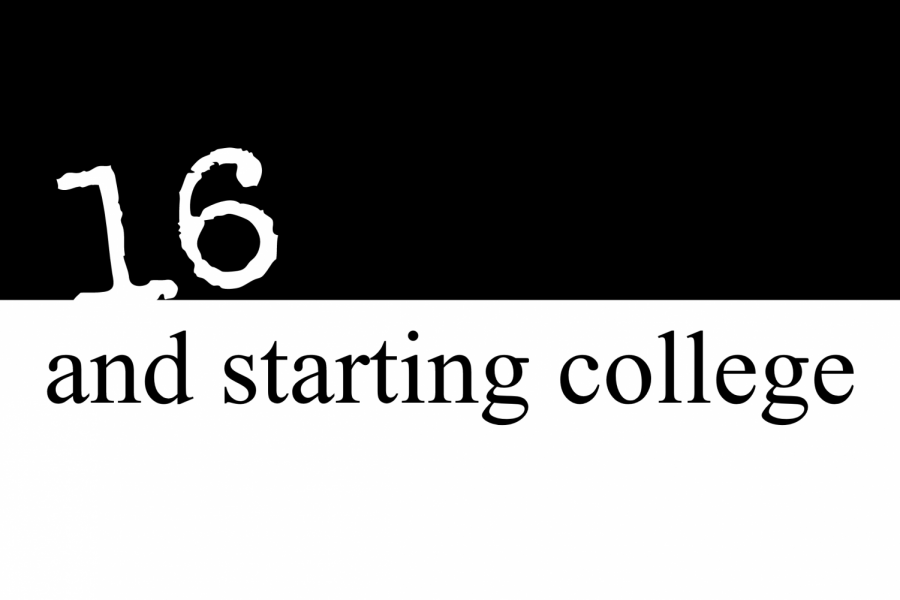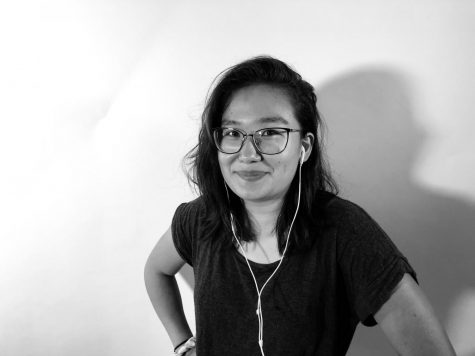16 and Starting College
Two City High students are choosing to leave high school early.
May 8, 2019
While taking the ACTs, applying to college, and eventually packing up to leave home may seem like something only upperclassmen have to worry about, two City High sophomores, Morgan Shelton ‘21 and Rylie Kelley ‘21, are enjoying their last trimester of high school before leaving for college in the fall.
“I’ve been thinking about it since like seventh grade, when I learned about the program,” Shelton said. “My parents and I had been talking about it on and off. We were like I might as well fill out the application, and then when I got accepted I was like, ‘Yeah, I’m definitely going to go.”
The Bucksbaum Early Entrance Academy, run through the Belin-Blank Center at the University of Iowa, is a program for highly motivated and gifted teens who are academically ready for college. Students can apply for the Bucksbaum program as either sophomores or juniors.
“Students have been going to college early for decades,” Jan Warren, assistant director for student services at the Belin-Blank Center, said. “There are famous people who have gone to college early, including Martin Luther King, Jr., Sandra Day O’Connor, and many others.”
However, the Bucksbaum Academy aims give their students a different experience than simply attending college early as King or O’Connor did. The Bucksbaum Academy aims to make the transition from high school to college as easy as possible while offering extra opportunities to their students.
“We try to smooth out some of the rough edges that are in place for students because they’re doing this out of step,” Warren said.
The two girls learned about the program independently of one another. Shelton, while looking online at the Belin-Blank summer camps, stumbled upon the Bucksbaum Academy home page and Kelley found out about the program through her mom, a university professor. As they were both very interested, they attended an information day together.
“In seventh grade, one of my teachers suggested that I do a program at the Belin-Blank center,” Shelton said. “I couldn’t do it that summer because I had another camp I was going to but I went to the website and I was like, ‘Oh, [the program] sounds cool.’”
A desire for more of an academic challenge and to get ahead in their schooling led both of the sophomores to apply to the program.
“I know that it sounds really dumb, but going to med school, getting a PhD, and going through college takes a really long time,” Shelton said.
The Bucksbaum Academy also has scholarships to offer, which, along with scholarships from the University, made it an easier financial decision for Shelton and Kelly. The average ACT score to get into the University of Iowa is 24, but the average ACT score to get into the Bucksbaum Academy is 31, making students eligible for university scholarships as well.
“[My parents] helped me process the concerns that I could have,” Kelley said. “They helped me pro-con it.”
The application process consisted of two letters of recommendation, a few essays, an essay from the parents, an ACT score of around 31, and an in-person interview.
“They’re truly very bright kids, but they also are very mature,” Warren said. “They’re socially ready to go, and their parents have confidence that they’re going to make good decisions while they’re here.”
The Bucksbaum Academy is a relatively small program compared to similar programs at other colleges. 12 students have confirmed that they will be a part of the program for the 2019-2020 school year.
“We choose to not be a big program, because we want to have a lot of what I call face-time,” Warren said. “I know all these students. I know a lot about them. I know where they’re from and all their parents.”
A week or two after they interviewed, when Shelton and Kelley found out that they had been accepted to the program, both automatically knew that they would go.
“We texted each other, we were like, ‘Do you have an email?’ We tried to be really ambiguous about it because we didn’t want to give hints if one of us had been accepted,” Kelley said.
While the idea of going off to college two years early may seem daunting and crazy to some people, both girls feel ready for this leap.
“[Older students] point it out to all of theirfriends,” Kelley said. “Then there’s the people that are weird. There was one person that was kind of proud but also seemed mildly weird about it.”
Nancy Sherman, a teacher of both Shelton and Kelley, feels as though they are both ready for college, but is unsure about sending kids to college when they are so young.
“[I have] mixed, mixed, mixed feelings,” Sherman said. “For some kids, I think it’s absolutely awesome [to] give them a chance to get a head start. At the same time I am worried that students are trying to grow up too fast.”
While high school teachers may worry about college forcing teenagers to grow up too quickly, Warren believes that these exceptionally smart teens need to go to college early so that they can push themselves by getting an education that is better for them.
“Students tell me, later on when they’re seniors or graduating, that they feel like this has been a lifesaver for them, and that’s pretty profound,” Warren said. “A lot of times we think, ‘Oh, gifted kids, they’re fine, they’ll be fine on their own.’ These kids really need it. They need the challenge, they need the academic rigor, and they need the social-emotional piece as well.”
Shelton and Kelley also feel like they won’t be academically missing much in the two years of high school that they’re skipping.
“I’m a little sad I’m going to be missing school dances, just that kind of thing,” Shelton said. “But I feel like the pros outweigh the cons.”
Sherman and Warren both say that adjustment to college life will most likely be a little bit challenging at first. Warren teaches a seminar for first year students that focuses on getting used to college.
“That is just another opportunity for me to meet with them once a week,” Warren said. “We do a session on how to manage your time, we do a session on how to work with faculty, just some of the basics that [are] helpful for them to know as new students on campus.”
Transitioning from the structure of high school to having only a few classes a day and not taking the same classes every day can seem especially daunting.
“Your classes are not as structured as high school and the first time you experience that, it’s easy to start skipping classes and it’s easy to not do homework,” Sherman said. “The freedom is awesome, but there’s a growing up that has to occur or you kind of blow it.”
As for Shelton and Kelley themselves, they both are more concerned about adapting to living out of the house than the educational aspect.
“I’m gonna have to figure out which buttons mean what on the washing machine [and] find a way to get to the grocery store,” Kelley said.
Along with washing clothes and cooking for themselves, the girls will be living in Daum Hall with the other members of The Bucksbaum Academy.
“They live in the honors residence hall, which is nice so that they all live on the same floor but then as well they’re surrounded by other honors students,” Warren said.
Shelton, having skipped sixth grade, will only be 15 at the beginning of her freshman year of college and will be too young to actually live in the dorms.
“They are still trying to figure out ways that I could possible live in the dorms,” Shelton said. “I’m definitely going to live there my sophomore year, but freshman year is still up in the air.”
Shelton will be receiving a key card that allows her to access all of the facilities of the Bucksbaum Academy, but she will be returning home every night.
“It’s not that far, about a 10-minute bike ride,” Shelton said. “In the winter I can also probably take a bus or get one of my parents to drive me. I still have several months until then to figure things out.”
Similarly, Kelley also does not know all the details of her room situation.
“I have no clue who my roommate is going to be, which is a little bit concerning, but I’m hoping to I find out who they are soon,” Kelley said.
She is looking forward to having all of her things in one place, which she hasn’t experienced before, as she has lived in two houses during high school.
“I’m excited [to live in a dorm room],” Kelley said. “It’ll be nice, because I’m going to be able to set my own schedule and have my own things.”
Warren and Sherman both advise the students to ask questions, do their school work, find resources, and get involved in study groups.
“Kids who are pretty bright don’t like to ask for help. They see it sometimes as a sign of not being as smart as everyone thinks they are or as being weak,” Warren said.
One of the special things about The Bucksbaum Academy are activities called “salons.” Salons give students the opportunity to have deeper, more meaningful conversations with each other, with teachers, and with community members. Salons deal with topics like empathy, community and wonder.
“[Salons] get into the conversations about the meaning of life, where you would have those more intimate conversations about life and learning and the likes of the mind, that maybe we don’t always get to have when we’re in a large lecture hall,” Warren said.
Last fall a salon was held with the mayor of Iowa City at a park south of town with a room looking out on the water. This gave students a chance to talk with the mayor about what makes Iowa City an appealing place for high school or college age students. This was also a great chance for kids, especially kids from out of state, to see parts of Iowa City apart from just the university campus.
“[Students] were able to submit ideas to [the mayor] and he took notes and he was so engaged with the students,” Warren said. “And they followed up with him. So that’s a cool option that the average college student doesn’t get.”
Another salon that they did dealt with empathy and was held on the top floor of the children’s hospital. Guests from the child life team who work with terminally ill children talked with the Bucksbaum students about their work. The students did a project for the kids as well.
“We think we all know what empathy means and what it’s about, but to really kind of think about it, and how we’re paying it forward in our own lives [is important],” Warren said.
The girls will not be graduating at from City High after their sophomore year because they will not have enough credits. They would like to use their college credit as high school credit to work towards high school graduation while in college. While this has not been approved by the school yet, Shelton and Kelley are looking at other options.
“If they don’t end up accepting college credit, then we’ll just end up getting our GEDs,” Shelton said.
A GED, or Graduation Equivalency Degree, which is acquired by passing a test, would act as a high school diploma so that girls wouldn’t actually need to graduate from high school. Another option they are considering is transferring their credits to a different school district with fewer graduation requirements and getting their diplomas there.
“[Kelley’s] dad lives in the Solon district, and my parents have a second house in a different school district,” Shelton said. “Both of us are considering transferring credits there and then graduating.”
As of now, Shelton and Kelley have not met the other kids going into the Bucksbaum program for the 2019-2020 school year. The students will meet before classes start. They will also attend a special Bucksbaum orientation the day before honors orientation. The girls hope to still see each other a lot while in college.
“Their dorm regulations might hinder it a little bit, but we want to try and take at least math classes together,” Kelley said.
This past year, Kelley has been taking PSEO (Post-Secondary Enrollment Option) courses and going to the University of Iowa during the school day. In the fall semester she took a course in Greek classics and now she is taking one on Russian literature.
“I’m doing that to make sure I feel confident in my collegiate academics,” Kelley said. “It’s more rigorous [than high school classes]. They ask more of you, which is definitely something to keep in mind. It’s harder, but not significantly so.”
While this is a big jump, both Shelton and Kelley know that they are doing what is best for their education and are looking forward to next year. With less than half a trimester left, Kelley and Shelton’s time at City High will soon be coming to an end.
“I’m pretty excited. It’s gonna be cool,” Kelley said. “I’m glad that I’m getting to do that next step. That makes me happy but a little bit nervous [as well].”




































Lin • Apr 21, 2020 at 3:08 pm
Wish we’d known about this a few years ago. My daughter graduated high school at 15, college at 19- landing at a large university after transferring from two other schools. Her *college prep* charter high school afforded zero assistance, advice, or even college prep, in reality. It’s been a challenging path on her own- this program sounds amazing! Thanks for the article.